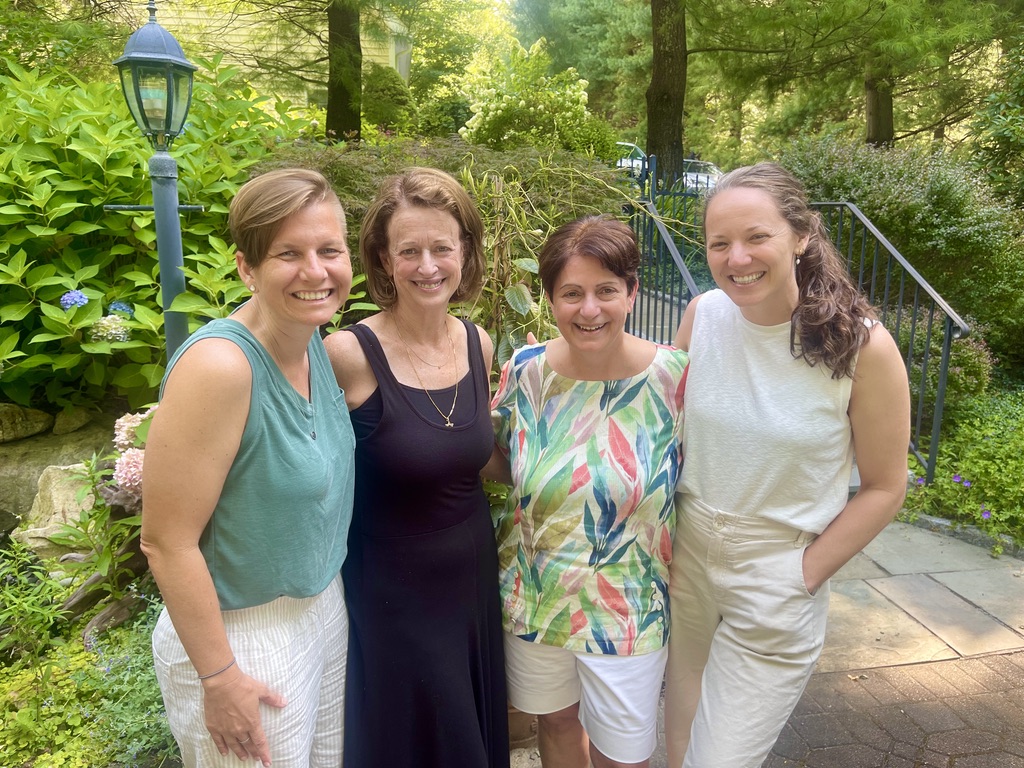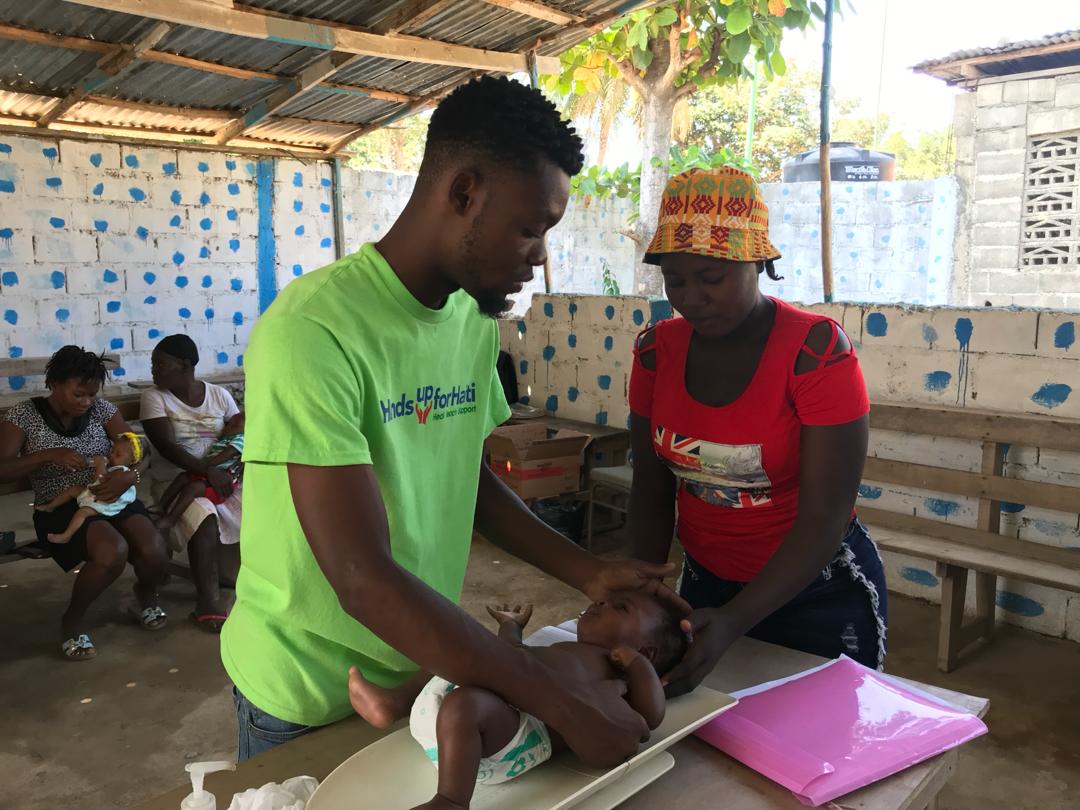by Margaret Keneman
At HUFH we know that healthcare is not just about treating medical problems; it is about identifying the source of the problem so that we can teach our patients how to prevent illness in the future. We also know that we have to be mindful, respectful, and culturally sensitive in our teachings. In other words, we cannot go into a clinic and preach about the importance of healthy gums if our patients have no access to dental floss. We have a responsibility to teach in a way that considers their resources, their abilities, their prior knowledge, and their socioeconomic status. Finally, as we identify areas where we can perhaps contribute aid, we have to maintain open lines of communication with the locals so that our contributions actually help in a way that is meaningful (to the people of Haiti) and sustainable (thanks to their involvement in a particular project).
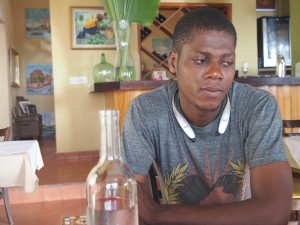
HUFH pharmacist Thermitus deep in thought
As part of our public health initiative on the July trip, we conducted this kind of research in order to evaluate our impact in the communities we serve and to find out what we can do to improve our efforts. We met with groups of locals to learn about their personal experiences with our current program on malnutrition, and two other areas where we might be able to contribute: (1) access to clean water and (2) safe cooking stoves. In this blog, we will discuss some of our initial findings from the focus groups on access to clean water and safe cooking stoves.
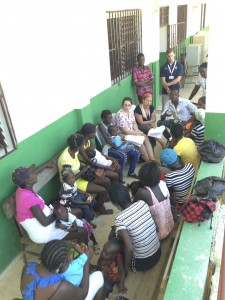
HUFH volunteer epidemiologist Lisa and translator Franz leading a focus group on nutrition in Bod me Limbe
Prior to the trip, we developed several questions to initiate our focus group discussions. Some of the questions that we asked were:
- “Where do you usually get water?”
- “What are the different solutions for cleaning water?”
- “Where do people in the community go to the bathroom?”
- “Do people get hurt when using cooking with fire?”
- “What can HUFH do better when working with your community?”
However, these questions were only meant to frame the discussions around the topics of water and cooking. More importantly, we were prepared to have honest conversations about the locals’ experiences and we were open to hearing their suggestions, ideas, and questions.
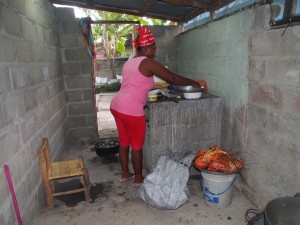
Cooking in Haiti
We conducted our focus groups at our four established HUFH locations: Shada, Bod me Limbe, Bois de Lance, and Jolitrou. In case you do not already know, Shada is a resource limited community in the heart of Cap Haitien, Bod me Limbe is a fishing village in the Bas Limbe area (west of Cap Haitien), Bois de Lance is a farming community just east of Limonade, and Joulitrou is a rural farming community (north of the city of Grande Riviere). While the locals from each community shared similar experiences, concerns, and ideas, there were some differences in their responses that perhaps reflected the particular region where they lived.
We do not have the time and space to discuss all of the findings from our focus group discussions in this blog, but we want to share some of our initial thoughts and interpretations. First of all, one of the biggest issues, which was expressed by participants at all four locations, is the confusion about how to treat water. There was no consistent understanding even within each group about water treatment options. Few participants seemed clear on how to use products such as bleach, aquatabs, and/or chlorine. More than anything else, they seemed fearful of these chemicals, and perhaps rightfully so. Although HUFH is not involved in the distribution of water treatment products, it might be valuable to hear that many local community members are interested in learning about the use of filters and/or the building of more wells.
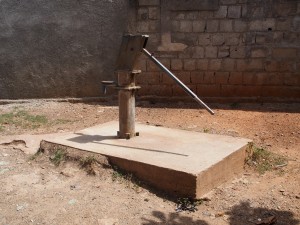
Water well in Haiti
The participants at all four locations also expressed, at one point in time or another, the tensions caused by the implementation of “community-use” resources such as wells, toilets, or cooking stoves to be shared by everyone in the community. On the one hand, they were open to the idea if only out of sheer necessity for the particular resource. But, being very perceptive, they discussed the frustration that comes along with having to share with other community members who may not take care of these resources or who may abuse their privileges.
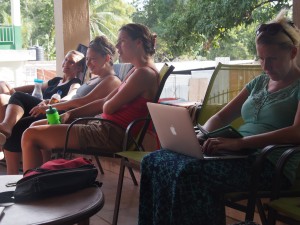
Margaret analyzes focus group data as volunteers debrief about the day
As the conversations became more engaged, the locals alluded to their desire not to necessarily get things but to learn things. Instead of a community well financed and built by a group of volunteers, for example, they would like to learn how to build their own wells. Their desire to learn was not limited to our chosen topics of water and cooking. Participants expressed interest in learning how to cultivate their farms, grow different crops, prevent deforestation, design crafts and artwork, and even start small businesses.
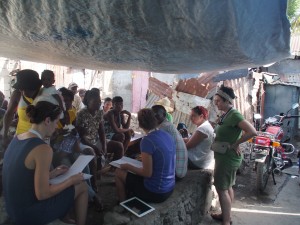
Dr. Mary Ann listening in as HUFH volunteer Jenn leads a focus group in Shada
Probably one of the most important issues to highlight from our focus groups was how vocal participants were about their contempt for empty promises made by foreign organizations. Madame Bwa, a respected health care worker in Shada, said that she would like to see volunteer groups build more toilets in her community, but she was skeptical that this would happen, since other organizations have entertained the idea but never followed through. This is a critical consideration at HUFH, which explains why we made every effort to be transparent with our focus group participants about the nature of our research. We will use our research to inform the commitments that we choose to make in the future, and we will continue our collaboration with locals so that we can uphold these commitments.
In the meantime, the detailed report of our findings, as well as the evaluation of our malnutrition program, will be available through the HUFH board members and management team in the upcoming weeks. Please contact Dr. Mary Ann LoFrumento, Dr. Jill Ratner, or Karen Akst Schecter if you would like to learn more about our research.
Finally, we would like to extend a HUGE THANK YOU – MESI AMPIL!!! – to all of the local translators and staff members that made our focus group sessions SO SUCCESSFUL. Conducting focus groups in more than one language is not an easy task, and our multilingual colleagues were critical team players throughout the entire process. We hope to continue to develop the language methodology we use during our discussions with the locals in Haiti so that our interactions can be as fruitful as possible. We have no doubt that our Haitian translators and staff members will continue to be vital contributors to this process, and we are very grateful that they are a part of our team.
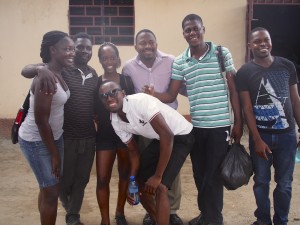
Volunteers Rosenie and Gayrleen with Dr. Manol and some of our wonderful translators

